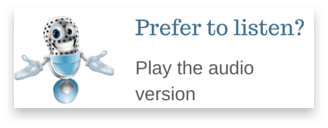How to Give a Great Motivational Speech
Learn how to give a great motivational speech step by step and review samples for understanding.
You will get your audience to get up and take action!
Several characteristics will make a speech motivating to others:
Our Guide to Motivational Speaking follows the sample speech and covers each aspect listed above in detail.

Besides the detailed guide, you will also find more tips and sample speeches on this page.
The speech below is a good one, as it pulls from personal experience in order to motivate the audience into getting up and doing something about their health.
If you have lived through something that has caused you to change in a big way, maybe not physically (as in losing weight), but perhaps mentally, emotionally or spiritually... then try writing about that! You'll find it much easier to give a motivational speech on something you've experienced first hand.
Sample Motivational Speech on Losing Weight
Introduction of the Speech
I'm so excited to be here today, talking to you all about losing weight by choosing a healthy lifestyle. You might ask, "How do you know what I'm going through?"
Three years ago, when I was just 30 years old, I weighed 315 pounds. That January I made a resolution to do whatever I needed to do in order to become healthy. I told my friends, "I'm going to lose the weight. When you see me this time next year, you will see a different woman."
People wished me well, but I'm sure they had their doubts. After all, I had tried fad diets before. Sometimes I lost weight, but I always ended up gaining it all back plus some. This time was different.
I made the lifestyle changes that were needed to get me to the healthy weight of 170 pounds today. I'm here today to tell you that you can do it too. You can lose the weight, keep it off, and live a healthier life.
Body of the Motivational Speech
I truly believe that the biggest factor in developing a healthy eating lifestyle is a positive, determined frame of mind. Diet plans I tried in the past didn't work, but to be honest I never really expected them to work.
The difference for me came from telling myself, "This is it. You can do it. You WILL do it." I didn't focus mainly on weight loss but on empowering myself to set goals and then meet them.
It is important to think positive thoughts about yourself
and your journey to a healthy lifestyle. You may face hard times during
your transition. The key is to stay focused on your goals and you will
always reach them. Like Ralph Marston has said, "Your goals, minus your
doubts, equal your reality."
Once I knew I was going to become healthier and lose weight, the next thing I did was throw away all the junk food in my house.
I don't know about you, but I knew if the food was in there, I was going to eat it. Anytime I went shopping after that only healthy foods made it into the house. I didn't starve myself. I like to eat too much for that!
It was all about learning a new way to eat. Every day I would fill up on vegetables, fruit, and lean meats. I encourage everyone here today to do a quick inventory of your pantry when you get home. Are these the foods that can help you become the healthy person you want to be?
My next step was to start exercising. At first it was difficult for me. I would get out of breath just getting ready to exercise! Did I let that stop me? No!
Every day I did as much as I could. I got off the couch
and spent time outside. I parked wherever there was a spot instead of
driving around waiting for the closest one. Gradually, I was able to
exercise more and more until I reached the point where I was able to jog
3-4 miles every day.
Conclusion of the Speech
This isn't a diet so there is no ending point. It is all about living every day, making right choices for my health. That is what has helped me to lose almost 150 pounds in three years. That is what has made it possible for me to do the things I want to do because I have the energy.
I make the decision to be healthy every day when I wake up. You can make that same decision. I believe in you. [CALL TO ACTION] Believe in yourself, lose the weight, and live the healthy lifestyle you have always wanted.

End of Motivational Speech
I hope this motivational speech has given you some ideas on how to develop one of your own. Pick a topic that you know something about or are passionate about and you should be able to write a kick-ass speech that helps to inspire someone into doing something that can change their life!
Words are powerful, use them wisely.
GUIDE TO MOTIVATIONAL SPEAKING

Passion: If you are genuinely passionate about the topic of your speech and believe in the message you are sharing, this will be contagious to your audience.
Personal stories: Sharing personal stories and examples can help make your message more relatable and compelling to your audience.
Inspiring language: Using positive and uplifting rather than pessimistic language can help inspire and motivate your audience.
Emotional connection: Connecting emotionally with your audience can be a powerful way to motivate them. You can achieve emotional connection through storytelling, vivid imagery, or evoking a shared sense of purpose or mission.
Asking for action: Giving your audience specific, actionable steps they can take to make positive changes in their own lives can help motivate them to take action.
More about how to develop each of these characteristics are mentioned in the detailed instructions.
If you're preparing a motivational speech for young kids, you can drop down to the tips to motivate children and the sample speech about motivating kids to respect teachers.
1. Passion
There are several ways to show passion in a speech:
First, use body language: Nonverbal cues, such as gestures, facial expressions, and eye contact, can help convey your enthusiasm and passion for the topic.
Use vocal variety: Varying pitch, volume, and pace can help convey your passion and keep your audience engaged.
Use descriptive language: Using vivid and descriptive language can help convey your excitement and enthusiasm for the topic.
Show emotion: Allow your emotions to show through your facial expressions and voice. This expression can connect with your audience and convey your passion for the topic.
Practice: Practicing your speech beforehand will help you feel more confident and comfortable, which can help you convey your passion more effectively.
2. Personal Stories
How does a speaker weave a personal story into the motivational speech.
First, choose a story relevant to your message: Your personal story should be related to the main points of your speech and help illustrate or reinforce your message.
Keep it brief: A personal story can be a powerful tool, but it's important not to let it dominate your speech. Keep it brief and to the point, and tie it back to your main message. For example, you can connect the story to the purpose of the speech by briefly mentioning how the story likens to the circumstances of the message.
Use descriptive language: Use descriptive language to bring your story to life and help your audience visualize and connect with it. To use descriptive language to bring a story to life, try to use specific and sensory details to help your audience visualize and experience the events of your story.
Understanding and using descriptive language requires skill. Here are some tips:
Use concrete nouns: Rather than using abstract or general terms, use concrete nouns to describe people, objects, and locations in your story. These specific descriptions will help your audience picture the scene more vividly.
Use adjectives: Adjectives can help add color and depth to your descriptions. Choose evocative adjectives that help convey your story's mood or atmosphere.
Use action verbs: Action verbs can help bring your story to life and make it more dynamic. Choose verbs that accurately and vividly describe the actions and movements of the people and objects in your story.
Use sensory details: Include details that engage the senses, such as sights, sounds, smells, tastes, and textures. These palpable details help your audience feel like they are experiencing the events of your story firsthand.
Use figurative language: Figurative language, such as similes and metaphors, can help create vivid and memorable images in your audience's minds. However, use such examples sparingly. A little spice goes a long way.
3. Inspiring Language
A motivational speech needs to use inspirational language. Practicing and developing the skill will help motivate your audience. Follow these instructions to improve:
- Use action verbs: Action verbs can help convey a sense of energy and purpose and encourage your audience to take action. To recognize an action verb, look for a word that describes an action or occurrence. Examples of action verbs include "run," "jump," "sing," "speak," "write," and "play."
- Use robust and confident language: Use strong, confident language to convey your conviction and belief in your message. For example, “we will succeed in our task.” This sentence conveys a sense of self-assurance and belief in our capabilities.
- Use rhetorical devices: Rhetorical devices, such as repetition, rhetorical questions, and rhetorical exclamations, can help emphasize and reinforce your message. Just be sure to use them sparingly to avoid distracting from your main points.
- Use vivid imagery: Use descriptions and vivid imagery to help your audience visualize and connect with your message. Vivid words can make your message more memorable and impactful.
Here is an example paragraph using vivid imagery to motivate:
"Imagine standing on top of a mountain, feeling strong as you look at the breathtaking view. You are fit and healthy, and your body can take on any challenge that comes your way. Take that feeling of strength and accomplishment and apply it to your journey towards a healthier weight. With each step, you are moving closer to that mountain top, feeling better and more confident in your skin. You can do this, and the rewards will be worth it."
4. Emotional Connection
Passion, personal stories, and inspiring language will all work to help you form an emotional connection with your audience when giving a motivational speech. Incorporate these additional points to help further connect.
- Use rhetorical devices: Rhetorical devices, such as rhetorical questions and exclamations, can help draw the audience into your message and create an emotional response.
- Use nonverbal cues: Nonverbal cues, such as gestures, facial expressions, and eye contact, can help convey your emotions and help your audience connect with you emotionally.
- Emote when storytelling: Telling the personal story taught previously dynamically and emotionally can help draw the audience closer.
- Evoke a shared sense of purpose or mission: Reminding the audience of a shared purpose or mission can create a sense of unity and help create an emotional connection.
5. Requesting Action
How can you finish a motivational speech with a call to action by giving your audience specific, actionable steps?
Here are some tips for incorporating the request for action into your motivational speech:
- First, make the request specific: Be clear about the action you want your audience to take, and provide specific steps or instructions for how to do so.
- Make the action achievable: Choose a realistic and achievable action for your audience.
- Make the request relevant: Ensure that the action you are asking your audience to take is relevant to your message and the goals you have outlined in your speech.
- Make the action timely: Encourage your audience to take action as soon as possible rather than waiting until a later time.
- Make the action impactful: Choose an action with a significant impact or result, and explain to your audience how their action will make a difference.
- Conclude with the call to action: End your speech with a clear and compelling call to action that summarizes your message and encourages your audience to take action.
For example, here is the Best Speech Topics call to action for writing a motivational speech.
"Now that you have learned the importance of passion, personal stories, inspiring language, and emotional connection in a motivational speech, I encourage you to take action and incorporate these elements into your speeches. Use your passion and personal experiences to bring your message to life, and use inspiring language and emotional connection to engage and motivate your audience. Remember, the power of a motivational speech lies not only in the words you say but also in the actions you inspire. So take the first step, and start making a difference today!"
Tips for Giving a Motivational Speech to Kids

Here are some tips for preparing a motivational speech intended for youth:
- First, know your audience: Consider the age, interests, and needs of the young people you will target with the speech. Identifying their interests will help you tailor your message and make it more relevant and engaging.
- Start with a strong opening: Grab the kids' attention with a strong opening statement or question that captures their interest.
- Use examples: Kids love an engaging story. Kids are more likely to understand and remember your message if you use examples and anecdotes to illustrate your points.
- Use language that kids can understand: Avoid using complex or technical language that may need help understanding. Instead, use straightforward language to get your message across.
- Use various delivery techniques: Consider using visual aids, and vary your tone, pace, and volume to keep kids engaged and maintain their attention.
- End with a call to action: Motivate kids to take action by ending your speech with a clear and specific call to action. For example, encourage the young audience to make a positive change in their lives or to get involved in a meaningful cause.
By following these tips, you can prepare a speech that will effectively motivate kids and encourage them to take action. As you may have realized, these same tips also work well for a motivational speech to adults.
Sample Motivational Speech to Kids
Introduction with an attention getting question and engaging story:
Hello kids!
I'm so glad to see all of you here today. I want to talk to you about something really important: respecting your teachers. What do you think? Is it important to show respect to teachers?
I have a story to share about a time when I learned the importance of respecting my teachers. In elementary school, I had a teacher named Mrs. Johnson. She was a kind and patient teacher, but I often got frustrated because I didn't understand what she was teaching.
One day, I got so frustrated that I snapped at her and said some unkind words. I didn't mean to be disrespectful, but I felt overwhelmed and upset. Mrs. Johnson was hurt and disappointed by my words, and I could tell that our relationship had changed.
After that incident, I realized that my behavior had been hurtful and unfair to Mrs. Johnson. So I decided to make an effort to be more respectful and considerate of her feelings. I listened more carefully in class, asked questions when I needed help, and apologized for my behavior.
Over time, Mrs. Johnson and I rebuilt our relationship, and I learned a valuable lesson about the importance of respecting my teachers.
Body of the Speech:
Your teachers are here to help you learn and grow. They spend a lot of time and energy planning lessons and activities to help you understand new concepts and skills. But, they also care about you and want you to succeed in school and life.
When you respect your teachers, you show them you value their efforts and appreciate their guidance. Therefore, listening to your teachers and following their instructions is essential, even when you don't agree with them or need help understanding something.
Respecting your teachers also means being kind and polite to them. Respect includes saying "please" and "thank you," raising your hand to speak, and being considerate of their feelings.
I know that sometimes it can be hard to show respect, especially when feeling frustrated or upset. But I promise you that it will make a big difference in your relationship with your teachers and your learning experience when you make an effort to be respectful.
Conclusion with a tie-in to the introduction story and a call to action:
Why did I share my story with you today about Mrs. Johnson? Because I want to encourage you to show respect for your teachers. Your teachers are here to help you learn and grow, and when you respect them, it helps create a positive and supportive learning environment for everyone. So, let's commit to showing our teachers the respect they deserve.
Thank you.
One of BST's Favorite Motivational Speeches
Steve Jobs' 2005 Stanford Commencement Address

Related tips and techniques
- Home
- Free Sample Speeches
- Motivational Speech



